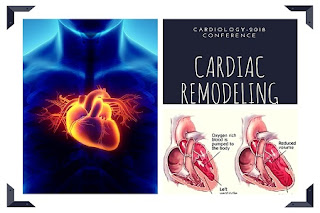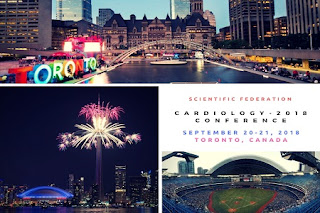2nd International
Congress and Expo on Cardiology
(Cardiology-2018 conference)
Scientific
Federation Organizing “2nd International Congress and Expo on Cardiology
(cardiology-2018)” conference during September 20-21, 2018 at Toronto,
Canada.
The 2nd International
Congress and Expo on Cardiology will be held during September
20-21, 2018 at Toronto, Canada under the theme of “Advances
in Clinical Cardiology and Recent Research on Future of Cardiac Health”
Which includes Keynote presentations, Oral talks, Poster presentations and
Exhibitions.
Cardiology-2018 will also provide the excellent opportunity to
meet experts, exchange information, and strengthen the collaboration among
Directors, Researchers, Associate Professors, and Scholars from both academia
and industry.
We make sure to support and motivate Young
Researchers to learn about the research areas of their peers to increase their
capacity as multidisciplinary researchers, Develop a foundation for
collaboration among young researchers, Interact and share ideas with both peers
and mentors, providing a holistic experience of academic tourism.
Chair of Cardiology-2018 conference:
Prof. Deepak Puri,
Executive
Director and Head of Cardiovascular Sciences in IVY Healthcare, Mohali, Punjab,
India.
Biography: Deepak
Puri Is Founder Chairman of Cardiomersion, a global group promoting integrated
approach to comprehensive cardiovascular care. He has keen interest in Off Pump
Coronary Revascularisation, Minimally Invasive Cardiac Surgery and Regenerative
therapy with 65 publications in reputed national and international journals
including chapter in book. Having presented more than 100 papers in conferences
across the globe, he been invited faculty in several international conferences
and organized more than 200 workshops as well as several international
conferences promoting integrated approach, innovative techniques, promoting new
technologies and exchanging skills with experts across the globe. He has worked
as Assistant Professor in Postgraduate Institute of Medical Education and
Research Chandigarh, Additional Director CTVS at Fortis Healthcare, Director
CTVS at Max Healthcare and has been visiting surgeon at University of Maryland
Baltimore, Swedish hospital Seattle as well as Leipzig Heart Center Germany.
Keynote Speakers for Cardiology-2018 Conference:
Dr. Wellnhofer
Ernst
German Heart Center & Charite
University Medicine Berlin, Germany.
Title of talk: Cyber security
is an increasing challenge in IT 4.0-hospitals.
Biography: Dr. Wellnhofer
has completed his MD in 1984 at Technical University in Munich and his PhD 2010
at Charite University Medicine Berlin on the field of “modelling and simulation
in cardiac imaging”. He has done studies in informatics and statistics as well
as health economy. He is clinical cardiologist, scientist and university
teacher. His fields of work are cardiac imaging in particular of coronary
atherosclerosis, biomedical informatics and statistics, regulatory issues
regarding software as medical device and health technology assessment. He
published more than 90 papers in reputed journals and holds several patents.
His h-index is 24.
Recently he has completed successfully several MOOCS
in data science and machine learning. After his retirement December 2017 he
will be working as guest researcher at the Institute for Cardiovascular
Computer-assisted Medicine at the Charite - Medical University Berlin.
Moreover, he will continue to work with German Heart Center on a medical device
project funded by the German Federal Ministry of Education and Research.
Prof. Attila Kardos
Milton
Keynes University Hospital, United Kingdom.
Title of Talk: Role of wearables in the
health care system.
Biography: Prof. Attila Kardos is a consultant cardiologist at
Milton Keynes University Hospital and has an Honorary Chair in the University
of Buckingham. He is also a Hon Senior Lecturer to the Division of
Cardiovascular Medicine, Radcliffe Department of Medicine Oxford University. He
is a clinical lead in multimodality Cardiovascular Imaging and a Vice Chair of
Research and Development and is the lead of the Cardiovascular Research Unit in
the Trust. His research interest includes advanced imaging based recognition or
cardiovascular pathologies utilizing Cardiac MRI, Cardiac CTA, and advanced
echocardiography. In addition, he is a principle investigator in a clinical
trial incorporating wearable devices in the hospital setting. His earlier
research encompasses exercise physiology and the influence of the autonomic
nervous system on exercise performance. Prof. Kardos is a local PI in several
commercial and non-commercial clinical trials. He is also a member of several
Editorial boards of a variety of scientific journals.

Dr. Sergey Suchkov
A.I. Evdokimov Moscow
State University of Medicine and Dentistry, Russia.
Title of Talk: Personalized and Precision Medicine (PPM)
as a model of healthcare of the newest generation: A Green Light Towards the
innovations to activate Translational Resources.
Biography:
Dr.
Sergey Suchkov was born in the City
of Astrakhan, Russia, in a dynasty of medical
doctors, graduated from Astrakhan State Medical University and was awarded with
MD. Then maintained his PhD and Doctor’s Degree. And later was working for
Helmholtz Eye Research Institute and Moscow Regional Clinical Research
Institute (MONIKI). Dr Suchkov was a Secretary-in-Chief of the Editorial Board,
Biomedical Science, an international journal published jointly by the USSR
Academy of Sciences and the Royal Society of Chemistry, UK. At present, Dr
Sergey Suchkov is: (i) a Director, Center for Personalized Medicine, Sechenov
University, (ii) Chair, Dept. for Translational Medicine, Moscow Engineering
Physical University (MAPhI), and (iii) Secretary General, United Cultural
Convention (UCC), Cambridge, UK. A Member of the: New York Academy of Sciences,
American Chemical Society (ACS),
American Heart Association (AHA), AMEE, Dundee, UK; EPMA, Brussels, EU; PMC, Washington, DC, USA and ISPM, Tokyo, Japan.
Organizing Committee members for Cardiology-2018
conference:
Prof.
Rachad Mounir. Shoucri
Royal Military College,
Canada.
Biography: Prof. Rachad Mounir. Shoucri has a B.Sc. in
Electrical Engineering from Alexandria University, Egypt, a M.Sc. in Optical
Physics, and a Ph.D. in Theoretical Physics from Laval University, Québec,
Canada. After graduation in 1975, he worked for five years at the Hospital
Saint-Sacrement and the Institut de Cardiologie de Québec where he developed his
current interest in mathematical physiology and in the application of
mathematics in cardiology. Since 1981 he is with the Department of Mathematics
and Computer Science at the Royal Military College of Canada, Kingston,
Ontario, where he is now Professor Emeritus.
Dr.
Arash Gharehbaghi
Mälardalen University, Sweden.
Biography: Dr. Arash Gharehbaghi, is a researcher in Biomedical
Engineering domain at Mälardalen University, Sweden. He received his MSc in
biomedical engineering from Amir Kabir University, Iran, his second MSc in Tele-media,
from Mons University, Belgium, and his Ph.D degree in biomedical engineering
from Linköping University, Sweden. He received the first prize of the young
investigator from International Federation of Biomedical Engineering (IFBME),
in the Nordic Baltic conference, 2014. His research is focused on innovative
devices for heart disease assessments, specifically development of machine
learning methods for processing heart sound signals toward the disease
diagnosis. His longstanding studies on heart sound signal processing, within
the last two decades, led to several international and domestic patents,
financed by different incorporations, toward creation innovative diagnostic
tools for heart disease assessments.
Dr. Shunji Sano
UCSF Benioff Children’s
Hospital, San Francisco.
Biography: Dr. Shunji Sano is a pediatric heart surgeon who
treats children born with heart defects. Over the course of his career, Sano
has performed more than 7,000 pediatric cardiac surgeries. Sano is world
renowned for surgical innovation. He pioneered a procedure to treat hypo
plastic left heart syndrome that is now called the Sano procedure and used by
many pediatric cardiac surgeons throughout the world. His research interests
include heart stimulation, neonatal surgery and progenitor cell therapy - also
called stem cell therapy. After earning his medical and doctoral degrees at
Okayama University Medical School in Japan, Sano completed residencies in
general surgery at Okayama University Hospital and Hiroshima City Hospital. He
completed fellowships in cardiovascular surgery, cardiothoracic surgery and
pediatric cardiothoracic surgery at Hyogo Kenritsu Amagasaki Hospital, Okayama
University Medical School, Green Lane Hospital in New Zealand and the Royal
Children's Hospital in Australia.
Sano
became a youngest consultant cardiac surgeon in pediatrics at Royal Children's
Hospital at age 37. At age 41, he became a youngest professor and chairman at
Okayama University Medical School and served in those posts for 24 years. Sano
is now a professor of surgery at UCSF.

Prof. P. Manokar
Sri Ramachandra
University, Chennai.
Biography: P Manokar is a Professor of Cardiology at Sri
Ramachandra University, Porur, Chennai, India. He qualified as the Youngest
Cardiologist to complete formal training in Cardiology at the age of 29 years
in India and then became the youngest to become Professor of Cardiology at the
age of 38 years. I work in a JCI accredited University Hospital, the largest
standalone private health care facility in South East Asia with over 2000 beds.
He trained at OSU under the able guidance of Dr WT Abraham. He heads the
Transplant Program and the AHS Training program in Sri Ramachandra University.
Prof. Pollen K.F. Yeung
Dalhousie University,
Canada.
Biography: Prof. Pollen Yeung completed his Ph.D from
University of Saskatchewan (Saskatoon, SK, Canada) and is currently Professor
of Pharmacy and Medicine (Cardiology) at Dalhousie University in Halifax, NS,
Canada. He has published more than 90 peer reviewed articles in reputed
journals and is currently Editor-in-Chief of Cardiovascular Pharmacology Open Access and an editorial board
member for Recent Review of Clinical Trials, Medical Sciences Monitor,
Metabolites, Natural Products Chemistry and Research Open Access, Cardiovascular and Hematological Disorder Drug
Targets, and Current Drug Safety.
After
all this, the conference will also include Plenary
presentations, Oral talks, Poster presentations and Exhibitions.
Our
pleasure to meet you in this upcoming event…!!!
.png)






















